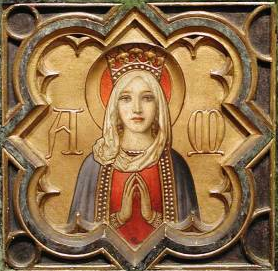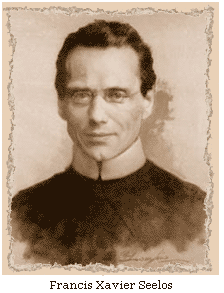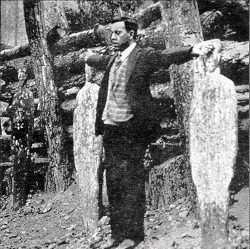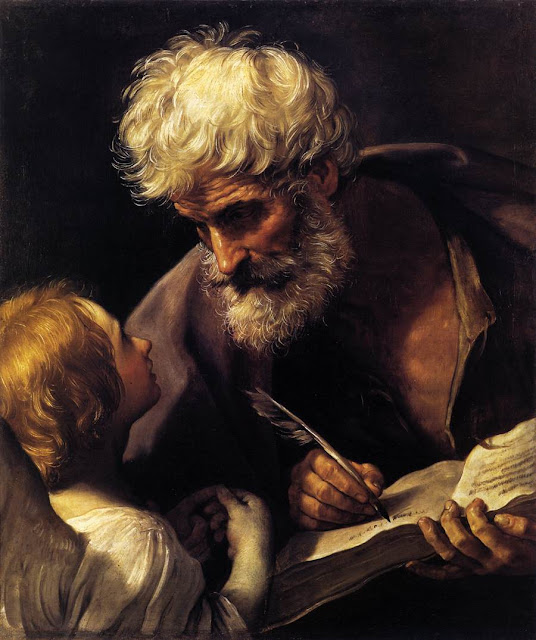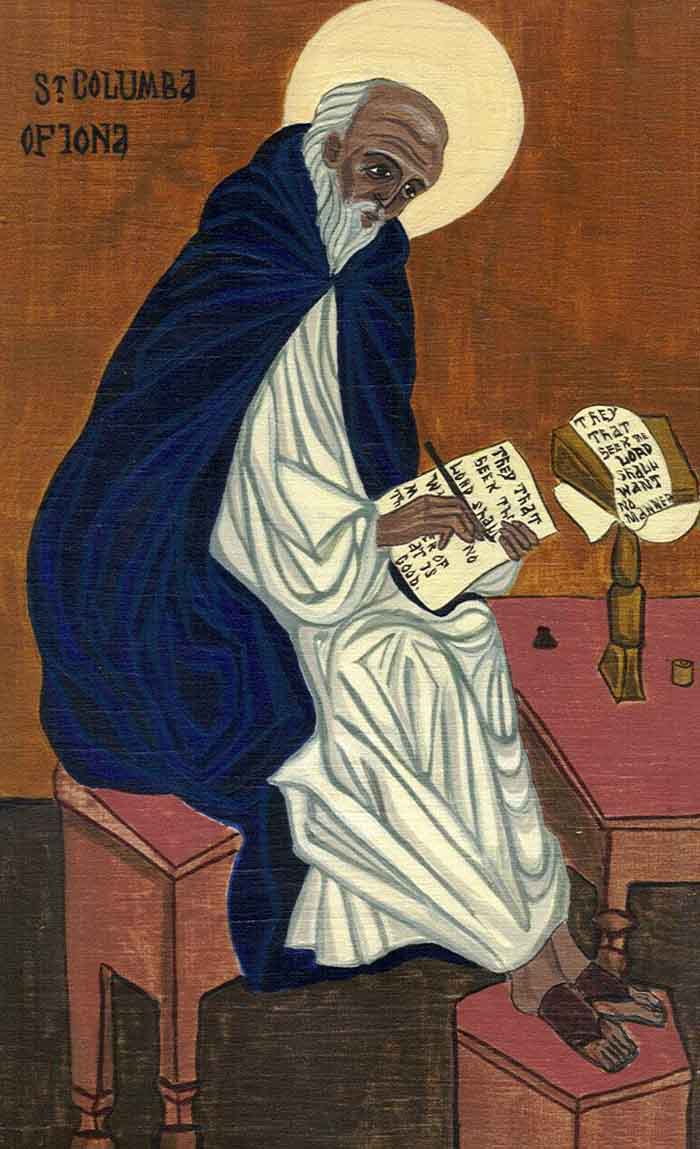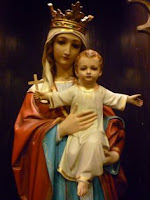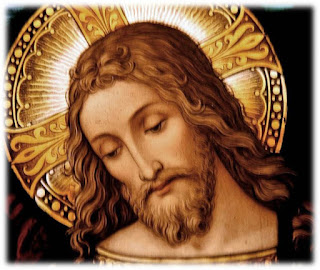+
“The splendour, the love, and the strength
be upon you.”
The extended excerpt printed below comes from C.S. Lewis' Perelandra, one of the books in his Space Trilogy. I think everyone should read everything C.S. Lewis wrote, but I acknowledge that in this day and age it is unlikely that most of those who read this and other blogs shall have had the time or the inclination to read Lewis' Space Trilogy. This Trilogy is in many ways the beginning of Science Fiction and Space Fantasy as we know it, but these books are so much more.
The following quotation may prove confusing at first, but imagine you have entered a temple on a non-terrestrial plane and beings greater than yourself are praising the Creator and trying to explain to you how things really are in the Great Creation all about you in this Universe. Drink in the words, and keep on reading. One can read it through and then come back and pour over each paragraph.
No one knows the extent of C.S. Lewis' own mystical experiences. Some have believed that he experienced such things of God that he struggled for language to explain to the average Joe precisely what he had encountered in God. I think the following passage from Perelandra goes a long way towards touching upon those things that would make certain kinds of christians very, very nervous. And other believers like me, well, such words delight the soul as they do touch on bright and luminous things of God that are beyond the pages of a sacred book or the precise rendition of liturgical choreography ... the substance of which leads to the very Heart of the Creator of All.
C.S. Lewis writes:
“We would not talk of it like that,” said the first voice. “The Great Dance does not wait to be perfect until the peoples of the Low Worlds are gathered into it. We speak not of when it will begin. It has begun from before always. There was no time when we did not rejoice before His face as now. The dance which we dance is at the centre and for the dance all things were made. Blessed be He!”
Another said, “Never did He make two things the same; never did He utter one word twice. After earths, not better earths but beasts; after beasts, not better beasts but spirits. After a falling, not recovery but a new creation. Out of the new creation, not a third but the mode of change itself is changed for ever. Blessed be He!”
And another said, “It is loaded with Justice as a tree bows down with fruit. All is righteousness and there is no equality. Not as when stones lie side by side, but as when stones support and are supported in an arch, such is His order; rule and obedience, begetting and bearing, heat glancing down, life growing up. Blessed be He!”
One said, “They who add years to years in lumpish aggregation, or miles to miles and galaxies to galaxies, shall not come near His greatness. The day of the fields of Arbol will fade and the days of Deep Heaven itself are numbered. Not thus is He great. He dwells (all of Him dwells) within the seed of the smallest flower and is not cramped: Deep Heaven is inside Him who is inside the seed and does not distend Him. Blessed be He!”
“The edge of each nature borders on that whereof it contains no shadow or similitude. Of many points one line; of many lines one shape; of many shapes one solid body; of many senses and thoughts one person; of three persons, Himself. As in the circle to the sphere, so are the ancient worlds that needed no redemption to that world wherein He was born and died. As is a point to a line, so is that world to the far-off fruits of its redeeming. Blessed be He!”
“Yet the circle is not less round than the sphere, and the sphere is the home and fatherland of circles. Infinite multitudes of circles lie enclosed in every sphere, and if they spoke they would say, For us were spheres created. Let no mouth open to gainsay them. Blessed be He!”
“The peoples of the ancient worlds who never sinned, for whom He never came down, are the peoples for whose sake the Low Worlds were made. For though the healing what was wounded and the straightening what was bent is a new dimension of glory, yet the straight was not made that it might be bent nor the whole that it might be wounded. The ancient peoples are at the centre. Blessed be He!”
“All which is not itself the Great Dance was made in order that He might come down into it. In the Fallen World He prepared for Himself a body and was united with the Dust and made it glorious for ever. This is the end and final cause of all creating, and the sin whereby it came is called Fortunate and the world where this was enacted is the centre of worlds. Blessed be He!”
“The Tree was planted in that world but the fruit has ripened in this. The fountain that sprang with mingled blood and life in the Dark World, flows here with life only. We have passed the first cataracts, and from here onward the stream flows deep and turns in the direction of the sea. This is the Morning Star which He promised to those who conquer; this is the centre of worlds. Till now, all has waited. But now the trumpet has sounded and the army is on the move. Blessed be He!”
“Though men or angels rule them, the worlds are for themselves. The waters you have not floated on, the fruit you have not plucked, the caves into which you have not descended and the fire through which your bodies cannot pass, do not await your coming to put on perfection, though they will obey you when you come. Times without number I have circled Arbol while you were not alive, and those times were not desert. Their own voice was in them, not merely a dreaming of the day when you should awake. They also were at the centre.
“Be comforted, small immortals. You are not the voice that all things utter, nor is there eternal silence in the places where you cannot come. No feet have walked, nor shall, on the ice of Glund; no eye looked up from beneath on the Ring of Lurga; and Ironplain in Neruval is chaste and empty. Yet it is not for nothing that the gods walked ceaselessly around the fields of Arbol. Blessed be He!”
“That Dust itself which is scattered so rare in Heaven, whereof all worlds, and the bodies that are not worlds, are made, is at the centre. It waits not till created eyes have seen it or hands handled it, to be in itself a strength and splendour of Maleldil. Only the least part has served, or ever shall, a beast, a man or a god. But always, and beyond all distances, before they came and after they are gone and where they never come, it is what it is and utters the heart of the Holy One with its own voice. It is farthest from Him of all things, for it has no life, nor sense, nor reason; it is nearest to Him of all things for without intervening soul, as sparks fly out of fire, He utters in each grain of it the unmixed image of His energy. Each grain, if it spoke, would say, I am at the centre; for me all things were made. Let no mouth open to gainsay it. Blessed be He!”
“Each grain is at the centre The Dust is at the centre The Worlds are at the centre The beasts are at the centre. The ancient peoples are there. The race that sinned is there. Tor and Tinidril are there. The gods are there also. Blessed be He!”
“Where Maleldil is, there is the centre He is in every place. Not some of Him in one place and some in another, but in each place the whole Maleldil, even in the smallness beyond thought. There is no way out of the centre save into the Bent Will which casts itself into the Nowhere. Blessed be He!”
“Each thing was made for Him. He is the centre Because we are with Him, each of us is at the centre It is not as in a city of the Darkened World where they say that each must live for all. In His city all things are made for each. When He died in the Wounded World He died not for me, but for each man. If each man had been the only man made, he would have done no less. Each thing, from the single grain of Dust to the strongest eldil, is the end and the final cause of all creation and the mirror in which the beam of His brightness comes to rest and so returns to Him. Blessed be He!”
“In the plan of the Great Dance plans without number interlock, and each movement becomes in its season the breaking into flower of the whole design to which all else had been directed. Thus each is equally at the centre and none are there by being equals, but some by giving place and some by receiving it, the small things by their smallness and the great by their greatness, and all the patterns linked and looped together by the unions of a kneeling with a sceptred love. Blessed be He!”
“He has immeasurable use for each thing that is made, that His love and splendour may flow forth like a strong river which has need of a great watercourse and fills alike the deep pools and the little crannies, that are filled equally and remain unequal, and when it has filled them brim full it flows over and makes new channels. We also have need beyond measure of all that He has made. Love me, my brothers, for I am infinitely necessary to you and for your delight I was made. Blessed be He!”
“He has no need at all of anything that is made. An eldil is not more needful to Him than a grain of the Dust: a peopled world nor more needful than a world that is empty: but all needless alike, and what all add to Him is nothing. We also have no need of anything that is made. Love me, my brothers, for I am infinitely superfluous, and your love shall be like His, born neither of your need nor of my deserving, but a plain bounty. Blessed be He!”
“All things are by Him and for Him. He utters Himself also for His own delight and sees that He is good. He is His own begotten and what proceeds from Him is Himself. Blessed be He!”
“All that is made seems planless to the darkened mind, because there are more plans than it looked for. In these seas there are islands where the hairs of the turf are so fine and so closely woven together that unless a man looked long at them he would see neither hairs nor weaving at all, but only the same and the flat. So with the Great Dance. Set your eyes on one movement and it will lead you through all patterns and it will seem to you the master movement. But the seeming will be true. Let no mouth open to gainsay it. There seems no plan because it is all plan: there seems no centre because it is all center. Blessed be He!”
“Yet this seeming also is the end and final cause for which He spreads out Time so long and Heaven so deep; lest if we never met the dark, and the road that leads no whither, and the question to which no answer is imaginable, we should have in our minds no likeness of the Abyss of the Father, into which if a creature drop down his thoughts for ever he shall hear no echo return to him. Blessed, blessed, blessed be He!”
—
And now, by a transition which he did not notice, it seemed that what had begun as speech was turned into sight, or into something that can be remembered only as if it were seeing. He thought he saw the Great Dance. It seemed to be woven out of the intertwining undulation of many cords or bands of light, leaping over and under one another and mutually embraced in arabesques and flowerlike subtleties.
Each figure as he looked at it became the master figure or focus of the whole spectacle, by means of which his eye disentangled all else and brought it into unity— only to be itself entangled when he looked to what he had taken for mere marginal decorations and found that there also the same hegemony was claimed, and the claim made good, yet the former pattern not thereby dispossessed but finding in its new subordination a significance greater than that which it had abdicated.
He could see also (but the word “seeing” is now plainly inadequate) wherever the ribbons or serpents of light intersected, minute corpuscles of momentary brightness: and he knew somehow that these particles were the secular generalities of which history tells— peoples, institutions, climates of opinion, civilisations, arts, sciences, and the like— ephemeral coruscations that piped their short song and vanished.
The ribbons or cords themselves, in which millions of corpuscles lived and died, were things of some different kind. At first he could not say what. But he knew in the end that most of them were individual entities. If so, the time in which the Great Dance proceeds is very unlike time as we know it. Some of the thinner and more delicate cords were beings that we call short-lived: flowers and insects, a fruit or a storm of rain, and once (he thought) a wave of the sea. Others were such things as we also think lasting: crystals, rivers, mountains, or even stars.
Far above these in girth and luminosity and flashing with colours from beyond our spectrum were the lines of the personal beings, and yet as different from one another in splendour as all of them from all the previous class. But not all the cords were individuals; some were universal truths or universal qualities. It did not surprise him then to find that these and the persons were both cords and both stood together against the mere atoms of generality which lived and died in the clashing of their streams: but afterwards, when he came back to earth, he wondered.
And by now the thing must have passed altogether out of the region of sight as we understand it. For he says that the whole solid figure of these enamoured and interinanimated circlings was suddenly revealed as the mere superficies of a far vaster pattern in four dimensions, and that figure as the boundary of yet others in other worlds: till suddenly as the movement grew yet swifter, the interweaving yet more ecstatic, the relevance of all to all yet more intense, as dimension was added to dimension and that part of him which could reason and remember was dropped farther and farther behind that part of him which saw, even then, at the very zenith of complexity, complexity was eaten up and faded, as a thin white cloud fades into the hard blue burning of the sky, and a simplicity beyond all comprehension, ancient and young as spring, illimitable, pellucid, drew him with cords of infinite desire into its own stillness. He went up into such a quietness, a privacy and a freshness that at the very moment when he stood farthest from our ordinary mode of being he had the sense of stripping off encumbrances and awaking from trance, and coming to himself. With a gesture of relaxation he looked about him. . . .
C.S. Lewis
Perelandra
The Macmillan Company
(1944)
“The splendour, the love, and the strength
be upon you.”
+
 WHO as the giver of all good things dwellest in this House of Prayer reared by human hands, and by the unceasing operation of thy grace dost sanctify the Church which thou thyself hast founded. And verily thy Church is the true House of Prayer, of which these visible buildings are but the figures. It is the Temple of the habitation of thy glory, the Throne of unchanging truth, the Holy Place wherein everlasting love abideth. It is the Ark which bringeth us, who are delivered from the deluge of the world, into the haven of salvation. It is the beloved and only Bride which Christ hath purchased with his Blood and quickened by his Spirit; in whose bosom we, who have been regenerated by thy grace, are fed with the milk of the Word, are strengthened with the Bread of Life, and are comforted by the help of thy mercy. This is that Bride that on earth, being holpen by the Bridegroom, fighteth the good fight of faith, and being crowned by him in heaven, singeth the songs of triumphant joy.
WHO as the giver of all good things dwellest in this House of Prayer reared by human hands, and by the unceasing operation of thy grace dost sanctify the Church which thou thyself hast founded. And verily thy Church is the true House of Prayer, of which these visible buildings are but the figures. It is the Temple of the habitation of thy glory, the Throne of unchanging truth, the Holy Place wherein everlasting love abideth. It is the Ark which bringeth us, who are delivered from the deluge of the world, into the haven of salvation. It is the beloved and only Bride which Christ hath purchased with his Blood and quickened by his Spirit; in whose bosom we, who have been regenerated by thy grace, are fed with the milk of the Word, are strengthened with the Bread of Life, and are comforted by the help of thy mercy. This is that Bride that on earth, being holpen by the Bridegroom, fighteth the good fight of faith, and being crowned by him in heaven, singeth the songs of triumphant joy.
